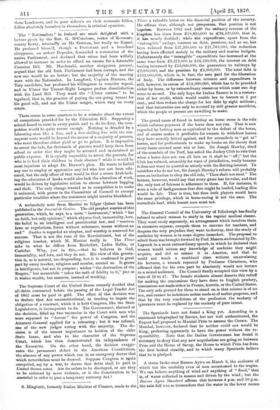The grand cause of fraud in betting on horse races
is the rule which enforces payment if the horse does not run. That is DOR regarded by betting men as equivalent to the defeat of the horse, and of course makes it profitable for owners to withdraw horses they have secretly betted against, and for scoundrels to "get at" horses, and for professionals to make up books on the theory that every horse entered must win or lose. Sir Joseph Hawley, tired' of the scandals of the Turf, has asked the Jockey Club to rule that when a horse does not run all bets on it shall be " off ;" but the Club has refused, ostensibly for want of jurisdiction, really because it does not want to quarrel so utterly with the Betting interest. To outsiders who do not bet, Sir Joseph Hawley's reform will probably seem an invitation to obey the old rule, "Thou shalt not steal." The bettors, however, would say that every game has its rules, and that the only teat of fairness is adherence to them. If, for instance, it were a rule of backgammon that dice might be loaded, loading dice would be fair. That is true, but then both players would have the same privilege, which in horse-racing is not the case. The scouudrels load, while honest men must not.






























 Previous page
Previous page